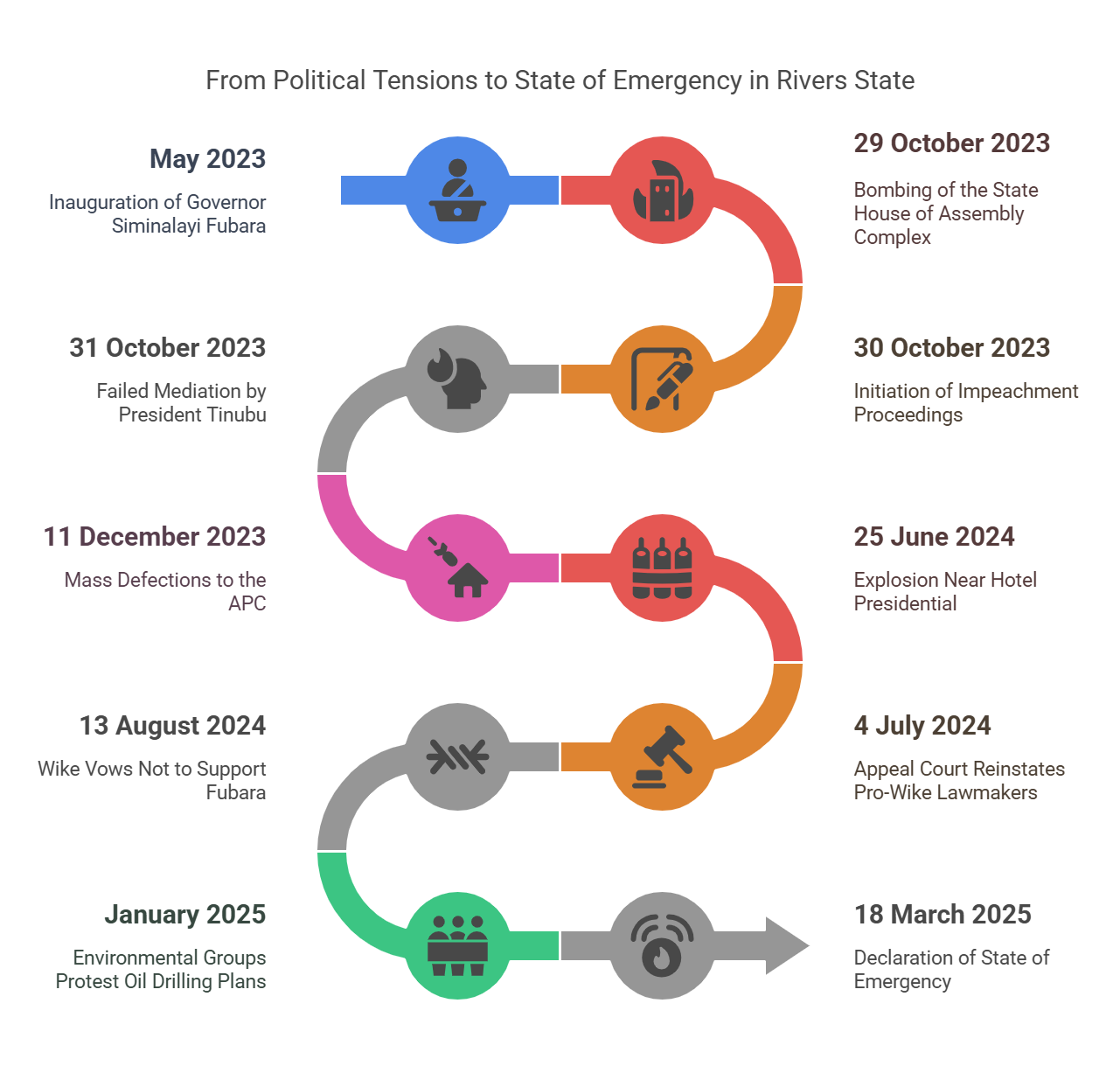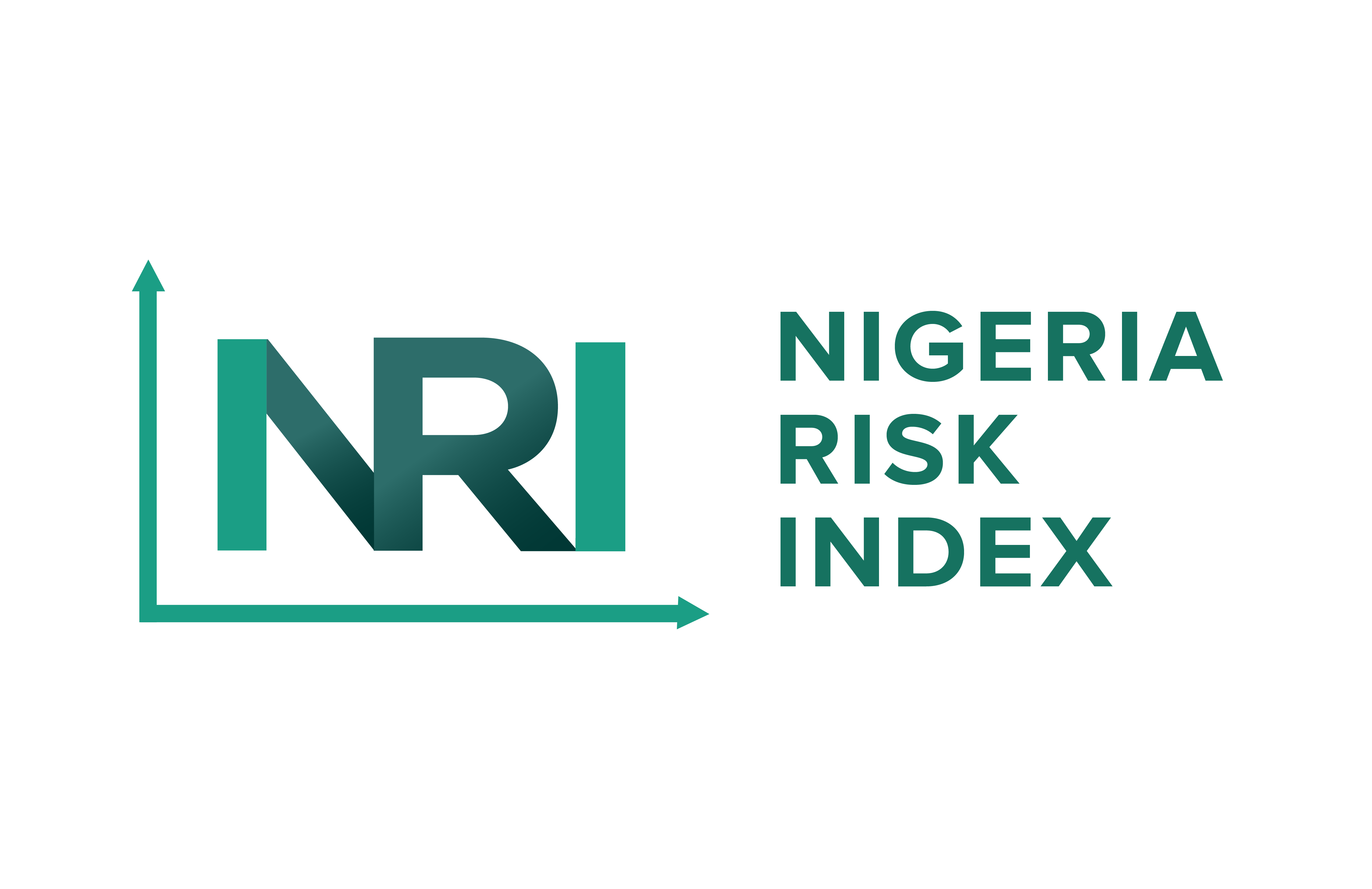Insights
Tinubu’s State of Emergency Escalates Crisis, Industries Brace for Impact
Port Harcourt, Nigeria – March 2025
In a dramatic escalation of Nigeria’s political crisis, President Bola Tinubu declared a state of emergency in Rivers State on March 18 2025, suspending Governor Siminalayi Fubara for six months and appointing retired Vice Admiral Ibokette Ekwe Ibas as Administrator. This move has sent shockwaves through political and business circles, raising urgent questions about stability, governance, and economic fallout. For industries operating in Rivers State, the unfolding drama is not just a political spectacle—it’s a looming threat to stability, operations, and profitability.
Rivers Political Landscape: A House Divided
The rift between Governor Fubara and Wike, now the Federal Capital Territory (FCT) Minister, has deepened in recent months. The state assembly, split into factions loyal to either Fubara or Wike, has become a battleground, with sessions often descending into chaos.
What began as a power struggle within the Peoples Democratic Party (PDP) has morphed into a full-blown political crisis, complete with allegations of sabotage, defections, threats of impeachment and now declaration of state of emergency. This state of emergency declaration is fraught with legal and political risks. Constitutional lawyers debate whether Tinubu’s suspension of Fubara exceeds executive authority, with the PDP already threatening litigation.
Political instability is not new to Rivers State, a region historically plagued by fierce rivalries and power tussles. However, the current crisis is particularly concerning due to its potential to spill over into the broader socio-economic fabric of the state. Rivers State is not just any Nigerian state - it is the heart of Nigeria’s oil and gas industry, home to the Port Harcourt Refinery, Onne Port, and numerous multinational corporations. Any disruption here sends ripples across the entire Nigerian economy.
Timeline of Crisis (2023-2025)

Industry Implications: Stability at Gunpoint?
Oil & Gas
The oil and gas sector is particularly vulnerable to the ongoing political instability, as Rivers State, a key contributor to Nigeria's oil production, plays a pivotal role in national revenue generation. Disruptions in this region could have devastating consequences, exacerbating existing challenges. Political unrest often triggers protests, blockades, and even the sabotage of critical oil infrastructure, while militant groups may seize the opportunity to exploit the situation and resume attacks on pipelines and facilities. Additionally, the Onne Port, which serves as a vital hub for oil and gas logistics, could face operational disruptions if the crisis deepens, resulting in delays in the importation of equipment and the export of crude oil—consequences that could ripple through global markets. Furthermore, multinational oil companies, already cautious about Nigeria’s volatile environment, might choose to postpone or abandon planned investments, further stalling the sector's growth and hindering its recovery.
To address these challenges, we recommend that companies should enhance security measures around critical infrastructure and collaborate with local communities to mitigate the risk of sabotage. In addition, they should diversify supply chains to reduce dependence on the Onne Port, and maintain open lines of communication with government agencies to stay informed about potential disruptions.
Manufacturing and Trade
Rivers State, a significant industrial hub with numerous manufacturing plants and the vibrant Port Harcourt Port, faces mounting threats from the ongoing political crisis, which risks destabilizing its economic ecosystem. Logistical challenges are looming, as protests and roadblocks could impede the movement of goods, causing costly delays and disruptions. Simultaneously, political tensions are likely to spill into the workforce, sparking strikes and protests that could exacerbate labor unrest. Moreover, a divided government may foster regulatory uncertainty, leading to conflicting directives that could confuse businesses and disrupt operations. To mitigate these risks, manufacturers are advised to stockpile critical inputs and arrange military escorts to ensure the safe transportation of goods. Additionally, businesses might consider relocating inventory to neighboring states such as Abia or Akwa Ibom to circumvent potential blockades. Embracing digital solutions to reduce reliance on physical presence during lockdowns could further help maintain operational continuity in these challenging times.
The Human Cost: A Tinderbox Ignites?
Tinubu’s gamble hinges on public tolerance for militarized rule. Youth unemployment hovers near 45%, and memories of #EndSARS protests linger. A heavy-handed crackdown on dissent could spark nationwide demonstrations, particularly if PDP governors frame this as Tinubu’s “power grab.” Meanwhile, ethnic tensions between Ikwerre, Ogoni, and Ijaw groups may erupt if Ibas’s administration is perceived as favoring one faction.
There are three possible outcomes to this problem.
Stabilization – Ibas restores order, enabling Fubara’s return in six months. Businesses rebound cautiously. Likelihood (40% Likelihood)
Escalation - Protests metastasize, drawing in Delta and Bayelsa militants. Oil output plummets, triggering a national recession. Likelihood (50% Likelihood)
Legal Quagmire - Courts overturn Tinubu’s decree, reinstating Fubara. Chaos resumes as rival factions vie for control. Likelihood (10% Likelihood)
Navigating the New Normal
For businesses in Rivers State, survival now depends on agility. Engage Ibas’s team early but discreetly, avoiding perceptions of collaboration. Diversify supply chains beyond the Niger Delta, and brace for cyberattacks as hacktivists target firms linked to the regime. Above all, monitor Abuja’s next moves - Tinubu’s possible willingness to replicate this playbook in other PDP states could redefine Nigerian federalism.
As soldiers patrol Port Harcourt’s streets, one truth is undeniable: Rivers State’s crisis is no longer local. It’s a litmus test for Nigeria’s fragile democracy.

The Risk Control Team
Related Blog Posts
- Security in Nigeria
- President Tinubu's Forest Guards Policy: A New Approach to Combat Terrorism & Kidnapping
- A SILENT WAR: Nigeria’s Gender-Based Violence Crisis Is Worse Than You Think
- Resurgence of Jihadist Activity in the Northeast
- Understanding the Surge in Killings Across Nigeria’s North Central Region: Drivers, Dynamics, and the Path to Stability
